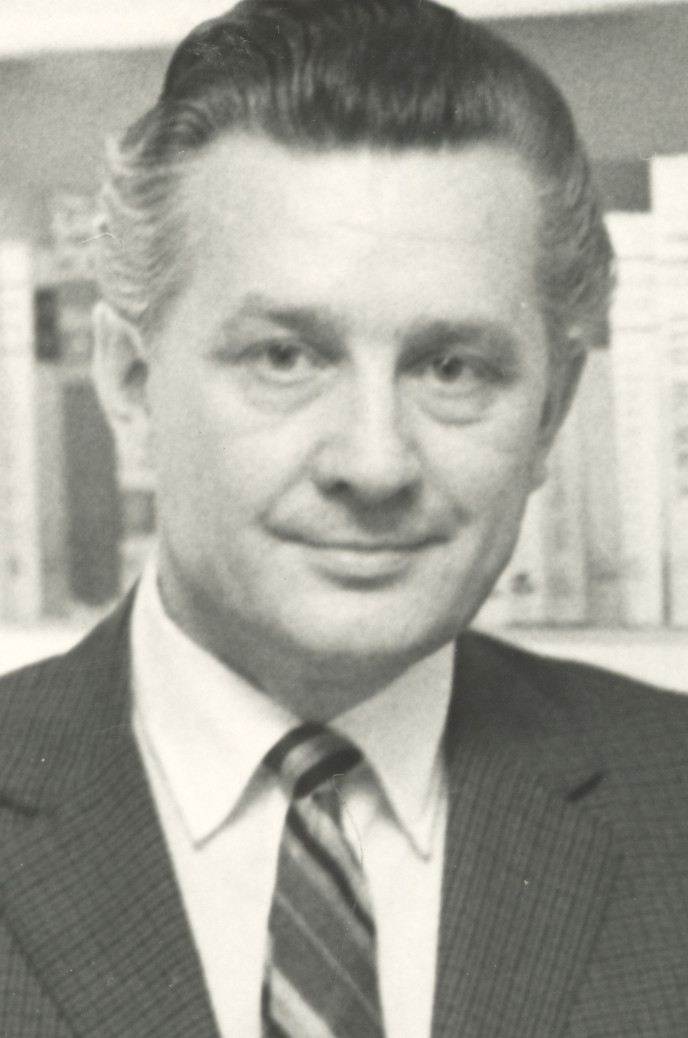
Ilmar Külvet
Ilmar Külvet (originally Kiilberg, 21. XI 1920 – 27. IV 2002) was a playwright, prose-writer and journalist who lived in Canada and the USA. In his plays, which deal with the problems of exiled intellectuals and Estonian refugees’ attitude to their unattainable homeland, he became one of the most significant playwrights of his generation in exile.
He was born at Keila, the son of a tailor, and attended the Gustav Adolf Gymnasium of Science, where he graduated in 1938. His journalistic career in Estonia began by working on the newspaper Rahvaleht. He became a full-time worker on the newspapers Eesti Sõna and Rindeleht after many professional journalists had been deported to Russia. After leaving his homeland in autumn 1944 he continued as a journalist in the offices of the newspaper Elav Sõna in Germany, and from 1953 to 1971 on the journal Kodukolle and as editor of the newspaper Vaba Eestlane in Canada. From 1971 to 1992 Külvet worked as a member of the editorial team, as editor-in-chief and deputy director of Estonian broadcasts for the Voice of America radio station in the USA.
He began his literary career with poetry. In the sixties Ilmar Külvet started writing plays alongside his journalistic work, and later short stories and novels as well. From childhood Külvet was interested in Norwegian literature, especially Henrik Ibsen. His Näitemänguraamat (‘Book of Plays’), containing five dramas, appeared in 1982. The range of plays embraces farcical comedies and allegorical fools’ plays as well as dramas reflecting the idealism and isolation of refugees. The drama Suletud aken (‘The Closed Window’), performed in 1979 at the Estonian Theatre in Stockholm, reveals the influence of Tammsaare. In 1990 the Vanemuine theatre staged the play Menning (written 1977), depicting the theatre director Karl Menning, who was devoted to art.
The short story collections Kuhu kuulud, Kristjan? (‘Where Do You Belong, Kristjan?’) and Jääkaru hingus (‘Breath of the Polar Bear’) appeared in Stockholm in 1982 and 1986 respectively, and the novels Suupill ja 500 tuubat (‘Harmonica and 500 Tubas’) and Kes oskab lugeda hieroglüüfe? (‘Who Can Read Hieroglyphs?’) in Lund in 1987 and 1989. In 1996 a selection of his short stories, Gulliveri käekõrval (‘Hand In Hand With Gulliver’) was published in Tallinn. Külvet’s last pieces of short prose were published in the journal Looming. His prose reveal problems of resignation, adaptation to the difficulties of life and the search for understanding.
Ilmar Külvet translated works by John Steinbeck, A.J. Cronin, H. MacLennan and B. Moore from English, and published stories, travel articles, sports commentaries and theatre criticism in periodicals. His work was recognised by the Estonian literature prize of Canada (1969), the Henrik Visnapuu Foundation prize (1982 and 1997) and awards from the cultural weekly Reede and the journal Looming. For some time he was secretary of the Estonian PEN Club in exile.
Through the works of Ilmar Külvet the reader and the theatregoer can get an impression of the fates and paths of those Estonians who left their homeland, of their self-awareness in new surroundings, of their rootlessness and their incorporation among foreign people, about the problems they encountered. He was regarded as a bridge-builder between exiles and homeland Estonians. His voice was probably heard through the static of the jammed stations by just about every Estonian living in the Estonian SSR.
L. P. (Translated by C. M.)
Books in Estonian
Novels
Suupill ja 500 tuubat. Lund: Eesti Kirjanike Kooperatiiv, 1987, 226 lk.
Kes oskab lugeda hieroglüüfe?. Lund: Eesti Kirjanike Kooperatiiv, 1989, 196 lk.
Short prose
Kuhu kuulud, Kristjan? ja teisi jutustusi. Stockholm: Välis-Eesti & EMP, 1982, 223 lk.
Jääkaru hingus ja teisi jutustusi. Stockholm: Välis-Eesti & EMP, 1986, 212 lk.
Gulliveri käekõrval. Kümme novelli. Tallinn: Kupar, 1996, 318 lk.
Plays
Näitemänguraamat. Toronto: Külvet, 1982 (Mississauga, Ontario: Somerset Graphics). 158 lk.
Articles and travelogues
Vana arm ei roosteta. Mälestusteos Ilmar Külveti 85. sünniaastapäevaks. Koostanud Vaike Külvet; toimetanud ja eessõna: Piret Noorhani. Tartu: Eesti Kirjandusmuuseum, 2005, 439 lk.



